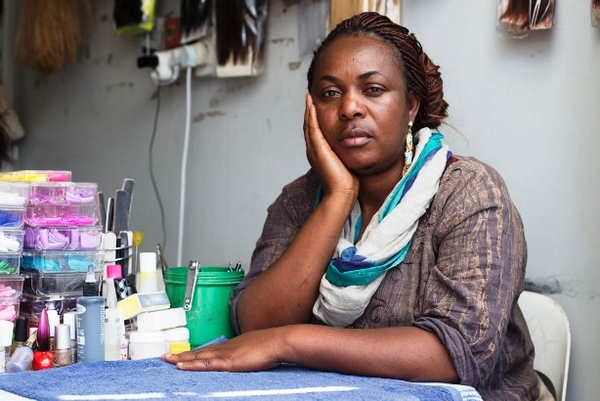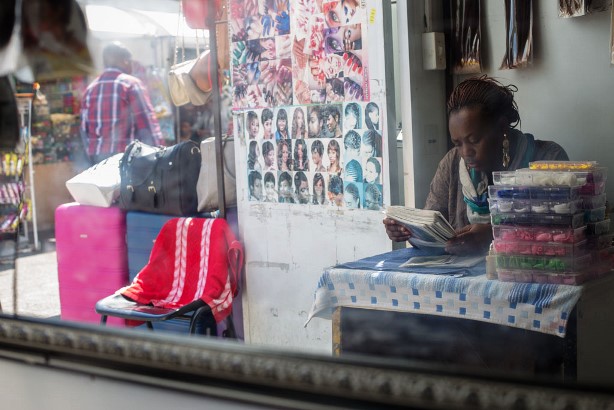A day in the life of a hairdresser

Loud reggae, pop and kwaito are some of the genres of music that compete with each other as you wander through the market at Cape Town central station taxi rank. Customers bustle through the rows of white container stalls, selling cheap snacks, fashionable clothing, haircuts and more. Among the many women entrepreneurs offering beauty services in the market is Odette Motema. She runs a hair and nail salon.
Loud reggae, pop and kwaito are some of the genres of music that compete with each other as you wander through the market at Cape Town central station taxi rank. Customers bustle through the rows of white container stalls, selling cheap snacks, fashionable clothing, haircuts and more. Among the many women entrepreneurs offering beauty services in the market is Odette Motema. She runs a hair and nail salon.

Odette’s day starts at 5.30am when she wakes up in her Khayelitsha home. She prepares polony sandwiches for her five children and gets them ready for school. She sets out a tub of bathwater for her unemployed husband and then heads to work.
“I always travel by taxi to work. They rob you too much on the trains,” says Odette.
She has breakfast at work, which also serves as lunch. Today, it is a banana, yoghurt and a packet of peanuts totalling R12.

Odette opens her stall, squeezed between a luggage stall and a male hair salon, at about 7am. The space is cramped, yet she has found room for a small plastic table and at least four plastic chairs. She has another six chairs stacked in the corner for her busy days. A shelf situated just above the entrance is packed with a range of beauty products and the walls of the container are covered with hanging pieces of “Indian”, “Brazilian” and other “types” of hair. A tiered plastic container carrying brightly coloured nail polish and fake nails sits on the table. Odette never leaves too many products in the stall for fear of them being stolen after hours.
“The crime is bad here. The security guards are supposed to stay overnight to protect the stalls, but they don’t. The last time my stall was broken into was sometime last year. But another woman’s stall was broken into last week.”

It’s a quiet day. While some stalls in the same row as Odette’s are packed with women and children having their hair braided, there are only two customers in Odette’s stall. Odette and Carrine, who is employed by Odette, are both braiding a woman’s hair, while another woman gives a man a pedicure.
“Sisi, Sisi!” yells Odette, as she tries to beckon potential customers into the stall.
At one point, a young woman waltzed into the stall with her hands in the air, exclaiming, “Jonga! I want to do something. I just don’t know what. I’m going out tonight.”
Odette shows her a photo album of elaborate nail designs. The customer seems interested, momentarily, but then leaves to check out the other stalls. Odette follows the customer with the album just in case she changed her mind.

Another man walks into the stall and proceeds to take his shoes off in preparation for a foot soak. However, while Odette boils the kettle and retrieves the foot-bath machine from its shelf, the man receives a phone call which causes him to hurriedly put his shoes back on.
“He has to do something quickly. I think he’ll be back,” says Odette. “At the moment, I see only about three customers in the day. I have the most customers from the 25th to the third of each month.”
Then someone walks into Odette’s stall and abruptly demands that the female customer having her hair braided pay him money he says she owes him. When she is unable to comply, he turns away and mumbles expletives. The man who has finished his pedicure gets up, grabs him by the collar and demands he apologise for his foul language around Odette. After several light punches, an apology is made and both men leave the stall. All the while, Odette has sat motionless.
“I’m worried about my brother’s short temper,” says Odette.

Once the stall is empty and Odette has swept the floors, she sits down to chat. She grew up in rural Congo, she says. “You’ve seen the news. You know what Congo is like.”
Her father was killed. She heard that life was better in South Africa.
Ten years ago, Odette, her husband and two children climbed into a truck and made the long journey to Cape Town.
“I don’t talk about this often and speaking about it now makes me want to cry,” she says.

Odette and her husband were unable to obtain official permits allowing them to work formally in South Africa. Odette says she did a course at Nails4U in Cape Town and then taught herself the art of braiding. She started offering her services informally at the taxi rank.
“We made this market what it is today. When I first started here, I had only one chair and a sign telling people to get their hair done. If we saw the police, we’d run away. Now, we rent these stalls for R1,300 a month. I pay R1,900, because I need electricity and water for my business. It is a struggle, because we can only rent these stalls, so if I die, my children will not inherit this stall,” says Odette.
Odette also teaches other women refugees the art of nail and hair treatment.
Carrine has been employed by Odette for a month. While braiding a woman’s hair, she says in French: “I came to South Africa from Kinshasa three months ago. I didn’t know anyone and I didn’t understand English. A man told me about this market and that one of the women who speak Lingala might be able to help me. I talked to a lot of hairdressers, but nobody helped me, except Odette.”
“I have no friends here,” says Odette, “When it comes to money and professionalism, there is only competition between the shopkeepers. You need to be clever so you can survive in South Africa.”
On quiet days, Odette closes her stall at 6.30pm, but on the busier days, she closes at 7pm.
“I want to make sure that I get the customers who come after work,” she explains.
With a packet of polony in hand, she returns home for the night. Her routine will begin again the next day, unless it is a Sunday.
“Sunday is my only day off,” she says.

Next: “A struggling old lady who sleeps like a bird,
Previous: Parents want Parliament Primary school principal dismissed

This article is licensed under a Creative Commons Attribution-NoDerivatives 4.0 International License.


